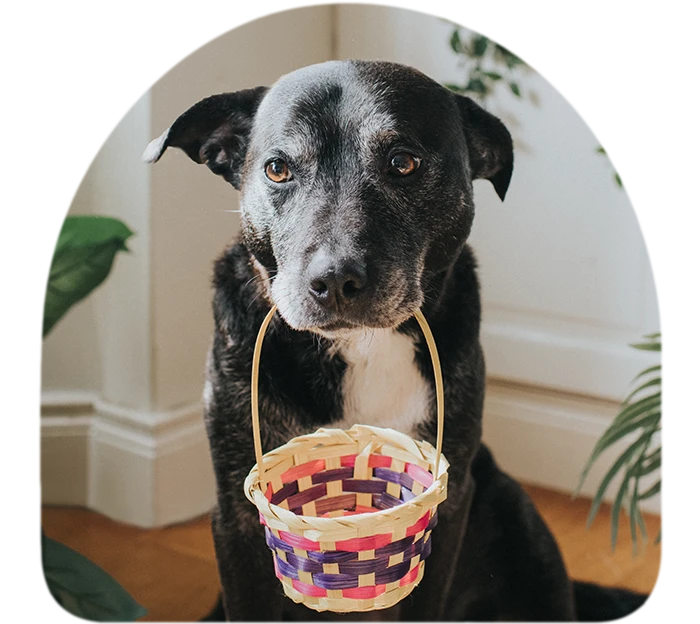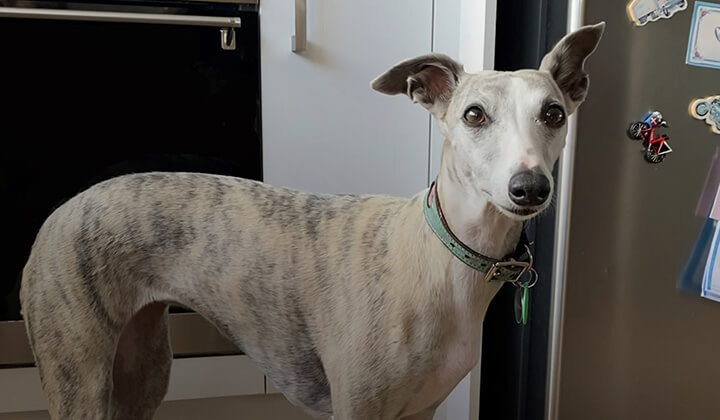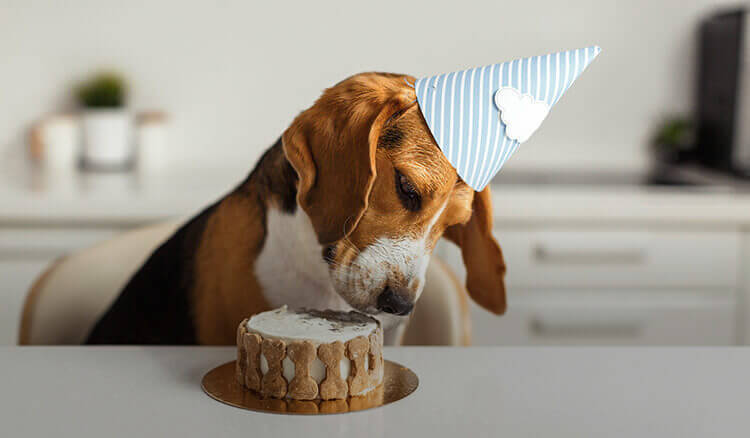Have fun with the whole family this Easter
The Easter Bunny and hunting for hidden Easter eggs are family-friendly traditions that go back centuries. Believed to have started in Germany, the original Easter eggs were often colourfully decorated chicken eggs and, later, cardboard eggs filled with treats. This has evolved to what we know today with chocolate eggs and lollies.
Many of us in New Zealand consider our dogs part of the family.1 And when it comes to family holidays like Easter, you might want your pooch to join in. However, the mainstays of modern Easter celebrations: chocolate eggs, lollies and hot cross buns, can be hazardous for our dogs’ health.
Chocolate, artificial sweeteners and raisins (a common ingredient in hot cross buns) are on our list of top foods your pet shouldn’t eat.
Why Easter treats are bad for your dog’s health
Chocolate
Chocolate contains theobromine, which is toxic for dogs. The darker the chocolate (the more cocoa it contains), the more toxic it is for dogs. Just 250g of chocolate could cause a severe reaction, including vomiting, tremors and an increased heart rate, in an average-sized Labrador.
Artificial sweeteners
The artificial sweetener xylitol is often added to confectionary, and ‘no sugar’ or ‘low sugar’ mints and chewing gums. It’s safe for humans but can cause liver damage in dogs.
Raisins
Raisins, currents and sultanas are key ingredients in a classic hot cross bun recipe. Experts aren’t sure why, but we do know they can cause dog kidney damage.
Keeping your dog safe while having fun this Easter
Be pet food safety aware
In 2023, we launched Paws Off!, an initiative to help educate pet owners and their friends about what human foods aren’t good to feed your pets. If you’re having a big family Easter BBQ this year, check out our food safety resources. You don’t have to give up your favourite human treats – it’s just good to be aware of what your dog should avoid.
Make sure everyone in your household knows about the dangers, too.
Plan an alternative easter egg hunt
If you’re going to do a traditional Easter egg hunt, count how many eggs and treats you’ve hidden and ensure they’re all found by the end of the hunt. While the hunt is on, keep your dog secured in a separate area or room with some toys and dog-safe treats to keep them entertained.
Want your pup to share in the fun? Try an alternative Easter egg hunt where ‘tokens’ can be cashed in for treats. Hide soft toys, plastic eggs or cardboard cut-outs depicting eggs for your children and pets to find, then swap them out for the appropriate treats for each lucky discoverer.
Keep toxic food out of reach
Dogs can be great at scavenging. Some will jump onto benches, pull open cupboards or snatch from unsuspecting young children. Take preventative measures to stop your pet from stealing food.
If you have a young child, keep an eye on them while they’re eating Easter treats, or secure your dog in a different room or space until your child has finished eating.
Safely secure foods and things you don’t want your pets to eat. Consider adding child locks to cupboards, don’t leave food on benchtops, and put unwanted leftovers in a pet-safe bin (like an outdoor bin).
If your dog starts acting out of character, and showing any of these signs, they may have eaten something they shouldn’t have.
What to do if your dog eats something they shouldn’t have
Contact your veterinarian and tell them what has happened as soon as you can. If possible, tell your vet what weight your pet is, what they’ve eaten and how much (for example, one 100g dark chocolate Easter egg). Your vet will advise you on what to do next.
Easter egg hunts can be a great family-friendly tradition. With these tips, you can ensure your Easter weekend is filled with fun activities and (safe) treats for you and your furry besties.
References
1Companion Animals in New Zealand 2016 Report


